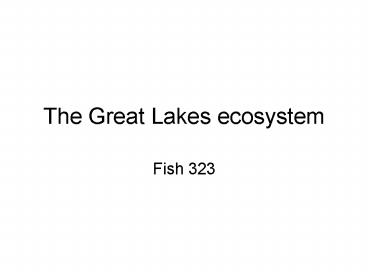The Great Lakes ecosystem - PowerPoint PPT Presentation
1 / 35
Title:
The Great Lakes ecosystem
Description:
1980s sea lamprey reduced, zebra mussels invade. Major factors. Invasions by exotic species ... Zebra mussel control $300 million/year. Sea Lamprey control $15 ... – PowerPoint PPT presentation
Number of Views:308
Avg rating:3.0/5.0
Title: The Great Lakes ecosystem
1
The Great Lakes ecosystem
- Fish 323
2
- Check Bronte et al. Cjfas 60 p 1552
3
(No Transcript)
4
(No Transcript)
5
Why the Great Lakes?
- Much more heavily impacted by humans that most
marine systems - May serve as a model for what could happen to our
marine systems
6
The state of Lake Ontario
The glass half empty The Lake Ontario fish
community has undergone a number of profound
changes from its original structure and
composition. Lake sturgeon, Atlantic salmon, lake
trout, lake herring, and deepwater ciscoes have
become either depressed or extirpated.
The glass half full As a result of recent
stocking programs and the introduction of several
exotic species, the present Lake Ontario fish
community includes top predators such as chinook
salmon, coho salmon, lake trout, brown trout,
rainbow trout, and walleye. This fish community
is associated with a forage base comprised
largely of alewife.
7
Lake Ontario fishery
In 1989, the landed catch from Lake Ontario and
the St. Lawrence River was valued at almost 1.3
million, and the commercial fishing industry was
estimated to employ over 300 people, mostly in
Ontario. Lake Ontario also provides a world-class
recreational fishery valued well over 200
million in 1989
8
Key Events (Lake Ontario)
- 1830-1840 Collapse of Atlantic salmon
- 1860s reduction of deepwater ciscoes, alewife
colonization - 1920 Lake whitefish, lake trout, burbot and sea
lamprey abundant, deepwater ciscoes scarce - 1940 lake trout, burbot, lake herring and
deepwater ciscoes collapse smelt rise - 1950 white bass, blue pike and deepwater sculpin
disappear, walleye dominant, lake whitefish
dominant - 1970s stocked salmonids increase, alewife die-off
1976 - 1980s sea lamprey reduced, zebra mussels invade
9
Major factors
- Invasions by exotic species
- Sea lamprey
- Alewife
- Zebra Mussels
- Fishing
- Pollution
- Toxic substances
- Eutrophication
- Stocking of Pacific salmon
10
Exotic species
- Great Lakes particularly vulnerable
- St. Lawrence Seaway, canals (migration)
- High volume of ship traffic (ballast water)
- Large human population size
11
Number of exotics
12
Exotics
13
Sources of exotic fish
14
High impact exotics
15
The Sea lamprey (Petromyzon marinus)
16
(No Transcript)
17
Methods of sea lamprey control
- Poison, lampricide
- Search for the silver bullet
- Once found widely used
- Passage barriers
- Sterile Male
18
What is TFM? During the 1950s, under
the direction of the U.S. Fish and Wildlife
Service, scientists tested almost 6,000 compounds
to identify one to which sea lampreys were
especially sensitive. Through this research,
scientists, in 1958, discovered that
TFM (3-trifluoromethyl-4-nitrophenol) was
remarkably effective in controlling sea lampreys
without significantly impacting other species.
19
(No Transcript)
20
Lake Ontario Lamprey impacts
21
Zebra Mussel
22
Key impacts of zebra mussels
- Physical impact 1 million per square meter
- Filter feeding, water clarity and food
availability
23
Estimated costs of exotics
- Zebra mussel control 300 million/year
- Sea Lamprey control 15 million/year
- Ballast water treatment 500,000 per ship
24
(No Transcript)
25
Lake Ontario Stocking
26
1989 Lake Ontario salmonid catch
27
Contaminants
- The Great Lakes are surrounded by some of the
most intensive industrial areas in the U.S. and
Canada - Have received enormous amounts of toxic chemicals
over the last 100 years - Most desired fish are at the top of the food
chain and concentrate contaminants in their fat
28
(No Transcript)
29
(No Transcript)
30
Issues not covered
- Impacts of overfishing
- Eutrophication
- Competition of exotic fish on native species
31
Status of Lake Superior 2003from Bronte, C. R.,
and coauthors. 2003. Fish community changes in
Lake Superior, 1970-2000. Canadian Journal of
Fisheries and Aquatic Sciences 601552-1574.
- Lake trout and lake whitefish approaching
ancestral abundance levels - Lake herring recovered
- Non-native salmonids naturally spawning and dont
need hatcheries - Forage species shifted back to native species
- Most pollution is from atmospheric sources
- Continued introduction of exotics threaten
32
Major lessons from Great Lakes
- Are much more heavily impacted than most marine
ecosystems - Lessons are similar to other freshwater systems
- The fish communities have been totally
transformed - Some stakeholders have benefited some have lost
- Economic value is probably higher now
- Is this the future of marine ecosystems?
33
Where Patterson Creek's muddy waters run
downPast the penny arcades, by the harbour
downtown,All the old Turtlebacks rust in the
rainLike they never will leave there again.But
leave there they will in the hours before
dawn,Slip out in the darkness without word or
songFor a few more years yet they will work
while they canTo catch tiny fish for Japan.No
white fish or trout here, we leave them
alone.The inspectors raise hell if we take any
home.What kind of fisherman can't eat his
catchOr call what he's taken his own?
34
But the plant works three shifts now. There's
plenty of pay.We ship seventeen tons of this
garbage each day.If we want to eat fish, then
we'll open a can,And catch tiny fish for
Japan.In the Norfolk Hotel over far too much
beer,The old guys remember when the water ran
clear.No poisons with names that we can't
understandAnd no tiny fish for Japan...So the
days run together. Each one is the same.And it's
good that the smelt have no lovelier name.It's
all just a job now, we'll work while we can,To
catch tiny fish for Japan.And we'll catch tiny
fish for Japan.
35
A turtleback































